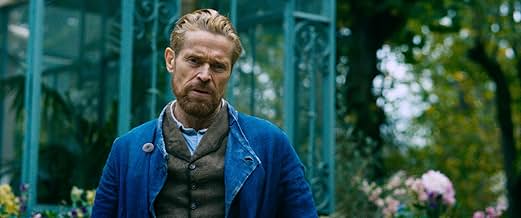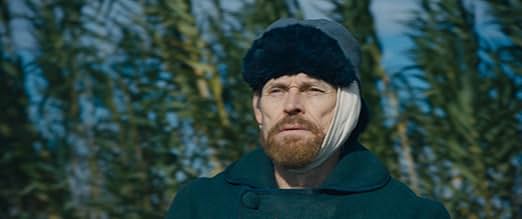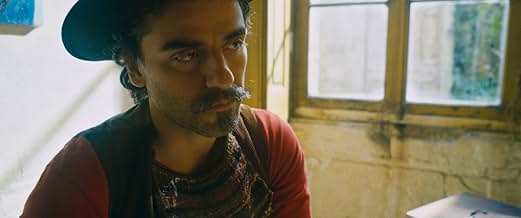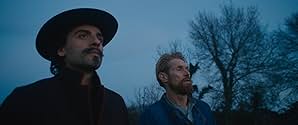Un regard sur la vie du peintre Vincent van Gogh en France à Arles et à Auvers-sur-Oise.Un regard sur la vie du peintre Vincent van Gogh en France à Arles et à Auvers-sur-Oise.Un regard sur la vie du peintre Vincent van Gogh en France à Arles et à Auvers-sur-Oise.
- Réalisation
- Scénario
- Casting principal
- Nommé pour 1 Oscar
- 3 victoires et 16 nominations au total
Clément Paul Lhuaire
- Emile Bernard
- (as Clément Lhuaire)
Alan Aubert
- Albert Aurier
- (as Alan Aubert-Carlin)
- …
Avis à la une
Vincent Van Gogh was a tortured soul that was, paradoxically, obsessed with beauty and wonder. Julian Schnabel (director) tries to give us a glimpse into the mind of the painter with this film and he delivers. This movie is not a biopic. It is more of an homage, an attempt to make us look at the world the way Vincent did.
With a dynamic camera, often hand-held, we wander around with Van Gogh (Willem Dafoe) trying to find interesting and striking images of nature, villages, people... The camera is always searching; different lenses, different angels, different distances... It finds new and inventive ways of filming. For example the split diopter is used, not to bring two objects into focus, but to blur par of the screen; and since Vincent had an eye condition, we are truly put in the artists shoes. Such a shame the movie at times loses itself in its eager to find yet another camera angle.
Sometimes a voice-over paints another image on top of what is shown. The score paints an atmosphere of ecstasy with a darker undertone. And Willem Dafoe paints an A+ performance, but he does it so well other actors sometimes disappear into his shadow.
Yet, this movie is an experience worth exploring. However it's tempo occasionally falters and instead of one long smooth stroke over the canvas, it sometimes feels more like a rough patchwork of different stories. It's sometimes messy, sometimes incredibly beautiful. Quite like Van Gogh.
This movie is not for everyone. Those who shiver when encountering vague, artsy-fartsy movies that call themselves art, better turn elsewhere. But those who can appreciate this way of filming and especially those who love Van Gogh's work, will adore this dreamlike exploration of Vincent's mind.
With a dynamic camera, often hand-held, we wander around with Van Gogh (Willem Dafoe) trying to find interesting and striking images of nature, villages, people... The camera is always searching; different lenses, different angels, different distances... It finds new and inventive ways of filming. For example the split diopter is used, not to bring two objects into focus, but to blur par of the screen; and since Vincent had an eye condition, we are truly put in the artists shoes. Such a shame the movie at times loses itself in its eager to find yet another camera angle.
Sometimes a voice-over paints another image on top of what is shown. The score paints an atmosphere of ecstasy with a darker undertone. And Willem Dafoe paints an A+ performance, but he does it so well other actors sometimes disappear into his shadow.
Yet, this movie is an experience worth exploring. However it's tempo occasionally falters and instead of one long smooth stroke over the canvas, it sometimes feels more like a rough patchwork of different stories. It's sometimes messy, sometimes incredibly beautiful. Quite like Van Gogh.
This movie is not for everyone. Those who shiver when encountering vague, artsy-fartsy movies that call themselves art, better turn elsewhere. But those who can appreciate this way of filming and especially those who love Van Gogh's work, will adore this dreamlike exploration of Vincent's mind.
This film succeeds in various ways: Dafoe delivers a marvelous portrayal of van Gogh, and Rupert Friend offers a dignified performance as Theo, his brother. The production design, costuming, and lush landscapes are all outstanding. As someone who has seen most of the films directed by Schnabel, I find him an insightful, astute director, yet I wish he would have introduced more nuance into certain scenes.
The invigorating piano score suffers from an overblown volume at various times. At the pre-release screening, more than a handful of people walked out of the film, midway. I think they were overwhelmed by a dizzy combination of loud music and jumpy, blurred camera techniques. As for me, the approach worked, adding a visceral punch.
Some of the dialogue was culled from Vincent's letters to his brother, and Dafoe rendered the text with a vulnerable immediacy. Several roles were aptly cast, but could have benefited from additional screen time: Isaac (as Gauguin), Almaric (Dr. Gachet), and Seigner (Madame Ginoux).
The invigorating piano score suffers from an overblown volume at various times. At the pre-release screening, more than a handful of people walked out of the film, midway. I think they were overwhelmed by a dizzy combination of loud music and jumpy, blurred camera techniques. As for me, the approach worked, adding a visceral punch.
Some of the dialogue was culled from Vincent's letters to his brother, and Dafoe rendered the text with a vulnerable immediacy. Several roles were aptly cast, but could have benefited from additional screen time: Isaac (as Gauguin), Almaric (Dr. Gachet), and Seigner (Madame Ginoux).
Loved the raw hand held camera work . The director shows the scene in such a that u can really enter into vincent's mind and can see his vision . Obviously the acting of Willem Dafoe was tremendous and he took the character to another level .
Vincent Van Gogh's last days in the south of France are depicted in this heartfelt drama by Julian Schnabel. Willem Dafoe gives a powerful performance as the destitute, troubled painter who was not understood by those in his own time. As Van Gogh seeks to express his extraordinary eye for nature and portraits, those around him are either put off, wary or sometimes intrigued. His brother is his only real comfort.
A deliberately paced film with a mournful soundtrack, this will leave you in a contemplative state. It does not tell you everything about Van Gogh or when his self-isolation began but it does seek to offer insight into his profoundly troubled mental state. His demons are quite evident throughout the film- everything from his intolerant response to the curiosity of schoolchildren to his difficulty explaining his world to whatever doctor is examining him, Van Gogh is exemplified in Dafoe's anguished face. Schnabel, himself a painter, brings his own perspective in piecing this film together, especially in showing how Van Gogh paints and goes about his craft.
The film is not without drawbacks. Oscar Isaac is miscast as Paul Gauguin, the French painter whom Van Gogh couldn't bear losing company with. And Mads Mikkelsen gets minimal screen time in a very thoughtful performance as an inquisitive priest who recognizes Van Gogh's uniqueness. But this film is Schnabel's interpretation of Van Gogh and Dafoe's exemplary portrayal of him and in that regard it works quite well. Recommended.
A deliberately paced film with a mournful soundtrack, this will leave you in a contemplative state. It does not tell you everything about Van Gogh or when his self-isolation began but it does seek to offer insight into his profoundly troubled mental state. His demons are quite evident throughout the film- everything from his intolerant response to the curiosity of schoolchildren to his difficulty explaining his world to whatever doctor is examining him, Van Gogh is exemplified in Dafoe's anguished face. Schnabel, himself a painter, brings his own perspective in piecing this film together, especially in showing how Van Gogh paints and goes about his craft.
The film is not without drawbacks. Oscar Isaac is miscast as Paul Gauguin, the French painter whom Van Gogh couldn't bear losing company with. And Mads Mikkelsen gets minimal screen time in a very thoughtful performance as an inquisitive priest who recognizes Van Gogh's uniqueness. But this film is Schnabel's interpretation of Van Gogh and Dafoe's exemplary portrayal of him and in that regard it works quite well. Recommended.
At Eternity's Gate is an amazing piece of art. I will admit that in order to fully appreciate its artistic offerings one would most definitely need very minor prior knowledge to who Vincent Van Gogh was. What his ideologies were, and the major events of his life, as well as his relationship with his brother. The way lines are repeated multiple times in a way that sounds like an echo chamber to show the audience the way Vincent is perceiving conversation on a delay, rationally speaking. One critique I see a lot is of the very long scenes of Vincent running around in wilderness looking for something to paint, and the overbearing music that surrounds those scenes. I disagree with these critiques but I do understand them. I feel it was necessary to have this music in order for the audience to understand the pure child-like joy Vincent felt while looking for something to paint, and while experiencing nature. I highly recommend this film for any Vincent Van Gogh fans. It is just shy of a perfect movie in my opinion, but I can see why someone would very much disagree with that.
Le saviez-vous
- AnecdotesWillem Dafoe was 62 when the film was released, 25 years older than Vincent van Gogh, who died at age 37.
- GaffesTheo tells Vincent at the hospital that he is now married. In reality Vincent received a letter from his brother on Dec 23rd 1888, in which he announced his engagement. Vincent feared that his brother would not be able to support him, once married. Additional to this he had the argument with Gaugin that night over Paul leaving. Mentally disturbed by all this he cut his ear off.
- Citations
Vincent Van Gogh: Maybe God made me a painter for people who aren't born yet.
Priest: Possibly.
Vincent Van Gogh: It is said, Life is for sowing. The harvest is not here.
- Crédits fousThere's a mid-credits scene, where a Paul Gauguin quote is narrated.
- ConnexionsFeatured in Sven Uslings Bio: 2019 Års sämsta biofilmer (2020)
Meilleurs choix
Connectez-vous pour évaluer et suivre la liste de favoris afin de recevoir des recommandations personnalisées
- How long is At Eternity's Gate?Alimenté par Alexa
Détails
- Date de sortie
- Pays d’origine
- Sites officiels
- Langues
- Aussi connu sous le nom de
- Van Gogh en la puerta de la eternidad
- Lieux de tournage
- Sociétés de production
- Voir plus de crédits d'entreprise sur IMDbPro
Box-office
- Montant brut aux États-Unis et au Canada
- 2 294 915 $US
- Week-end de sortie aux États-Unis et au Canada
- 92 856 $US
- 18 nov. 2018
- Montant brut mondial
- 11 519 666 $US
- Durée1 heure 51 minutes
- Couleur
- Rapport de forme
- 2.35 : 1
Contribuer à cette page
Suggérer une modification ou ajouter du contenu manquant




































